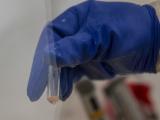May 30, 2007 (CIDRAP News) – VaxGen Inc., which lost an $877.5 million contract with the US government for a new anthrax vaccine in December, announced May 24 it was stopping development of the vaccine and said it hopes to license the product to another company.
The 2004 contract was the first and largest under Project BioShield, a federal program to promote the production of medical countermeasures for biological weapons and related threats. It called for VaxGen to produce 75 million doses of a new anthrax vaccine for the US civilian stockpile, or enough to immunize 25 million people.
The government canceled the contract because VaxGen couldn't start its phase 2 clinical trial by Dec 18, a milestone required by the US Department of Health and Human Services (HHS). Problems with the vaccine's stability contributed to the delay. In November the US Food and Drug Administration (FDA) had placed a clinical hold on the vaccine.
In a May 24 press release, VaxGen said that despite the HHS action, the company has achieved several development milestones to improve the chances of licensing the vaccine to another company. The milestones included developing multiple vaccine formulations showing improved stability, completing validation of bulk drug manufacturing, and producing clinical-grade bulk drug inventory, the company said.
"In part, as the result of the progress we made, we now have several discussions underway to partner our rPA [recombinant protective antigen] anthrax vaccine program," said James P. Panek, president and chief executive officer of VaxGen, in the press release.
Lance Ignon, a VaxGen spokesman, declined to say when a partnership agreement could be reached, but said the company had "narrowed the field considerably," according to a May 25 Reuters report.
In stopping work on the vaccine, the company laid off 20 employees, or 20% of its workforce, the press release said.
According to the company, HHS recently issued a notice that it needed 25 million doses of an anthrax rPA vaccine with an option to buy 40 million more doses. The notice also said respondents must have an FDA investigational new drug application that is not on clinical hold, which VaxGen said appears to exclude the company from responding to the HHS request.
"We are pleased to see that HHS continues to require an rPA anthrax vaccine and believe VaxGen's candidate will, in the hands of another company, prove to be a strong contender to meet this need," Panek said in the press release. He added that he had difficulty understanding how some aspects of the HHS notice contribute to the advancement of a new anthrax vaccine.
VaxGen's anthrax vaccine is based on a recombinant form of rPA, a key anthrax protein. It was expected to provide immunity in three doses, rather than the six doses required for the licensed vaccine, called anthrax vaccine adsorbed (AVA), developed in the 1950s, and to cause fewer side effects. Some military personnel have objected to AVA because of reported serious side effects.
Last May the Government Accountability Office said the HHS contract with VaxGen was too rigid and might discourage other biotechnology companies from pursuing Project BioShield contracts. Developing new vaccines is expensive and difficult, and biotechnology companies have referred to the time between the award of a BioShield contract and eventual payment as "the valley of death."
In December Congress passed legislation designed to strengthen the BioShield program under the new Biomedical Advanced Research and Development Authority within HHS. The legislation is intended to help contractors clear financial and production hurdles by allowing HHS to pay them when they achieve certain development milestones, instead of requiring them to deliver a finished product before getting any money.
See also:
Dec 20, 2006 CIDRAP News article "HHS cancels VaxGen anthrax vaccine contract"
Nov 6, 2006 CIDRAP News article "FDA orders delay of anthrax vaccine trial"


















